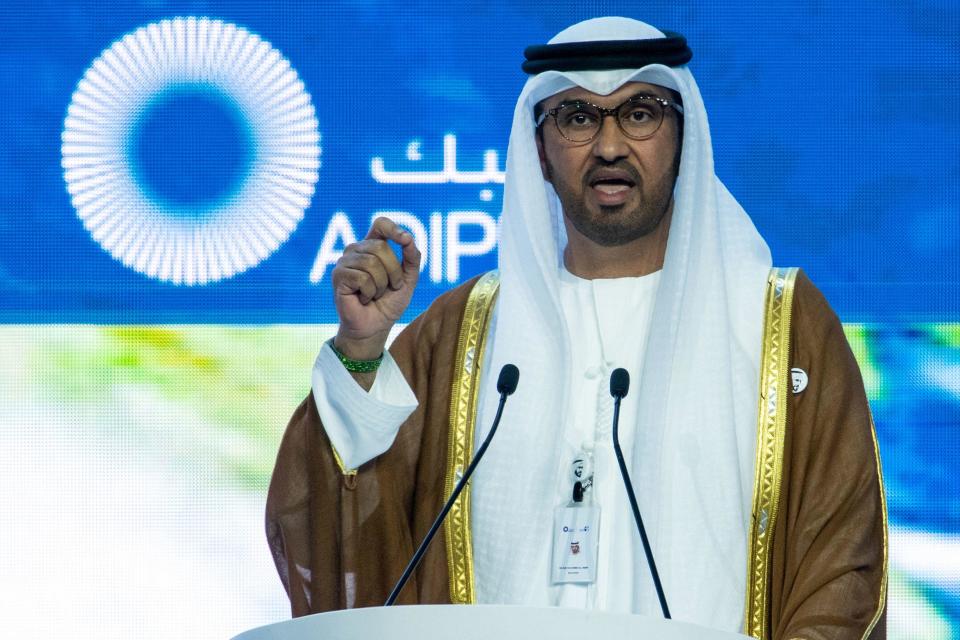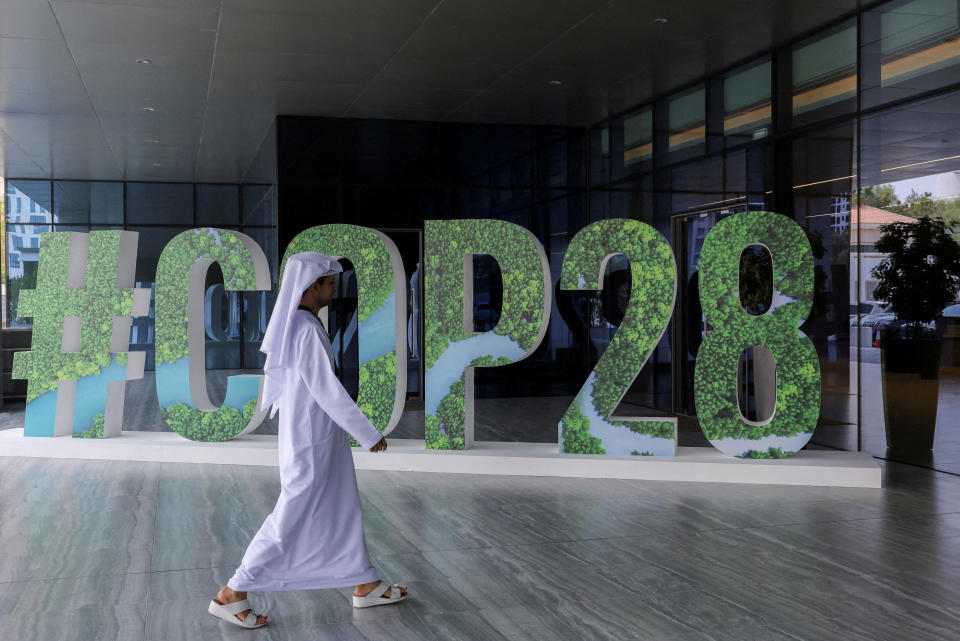UAE sought to use role in climate summit to make oil deals, BBC reports
The host of the upcoming COP28 climate summit, the United Arab Emirates, planned to use its role as an opportunity to try to make oil and gas deals with other countries, CBS News partner network BBC News reported Monday.
The BBC obtained leaked briefing documents showing that the president of COP28, Dr. Sultan al-Jaber, planned to discuss oil and gas commercial interests with 15 nations during meetings with foreign officials in the leadup to the global climate conference on Nov. 30.
Al-Jaber is also the CEO of the UAE's state oil company, Adnoc, and its renewable energy company, Masdar. It is the job of the president of the U.N.-sponsored climate summit to encourage countries to be as ambitious as possible in their climate goals. As part of its preparations for this year's conference, al-Jaber hosted meetings with governments around the world.

The documents obtained by the BBC showed prepared objectives for al-Jaber's meetings, as well as information on the officials he would be speaking with. For more than two dozen countries, the documents included talking points put together by the oil company, Adnoc, and the renewables company, Masdar.
Discussing commercial opportunities
Ahead of his meeting with Brazilian environment minister Marina Silva, the talking points provided to al-Jaber by Adnoc said the company had "identified Brazil as a strategic company for investment" and that it was in the early stages of a deal to try to acquire another petrochemical company there, the BBC reports.
"Securing alignment and endorsement for the deal at the highest level is important for us," the talking points say. "Ask: Your support in facilitating a call with the appropriate minister."
For his meeting with China, the Adnoc talking points provided toal-Jaber laid out the possibility of a new deal over liquified natural gas, saying it was "willing to jointly evaluate international LNG opportunities (Mozambique, Canada, and Australia)."
To the oil-producing nations of Venezuela and Saudi Arabia, Adnoc reportedly advised al-Jaber to say "there is no conflict between the sustainable development of any country's natural resources and its commitment to climate change."
There were also notes provided by the renewable energy company, Masdar, ahead of al-Jaber's meetings with 20 countries, including the United States, the BBC reported.
In its notes for al-Jaber, Masdar said the U.S. was "a key market" and that the renewable energy company was "aiming to grow its presence in the U.S. through acquisitions in the short term." It also said it hoped "to have the support of the administration" for certain approvals.
It was unclear how many times, if at all, al-Jaber raised the talking points provided by Adnoc and Masdar in his meetings with foreign officials. A State Department spokesperson told the BBC that U.S. climate envoy John Kerry never discussed Masdar or commercial activities in any of his meetings with al-Jaber.
In its response to the BBC, the UAE team did not deny using COP28 meetings for business talks, and said "private meetings are private." It declined to comment on what was discussed and said its work has been focused on "meaningful climate action."
Violating standards
The standards of conduct for COP presidents (COP stands for "Conference of the Parties," a series of global summits on climate) are set by the United Nations Framework Convention on Climate Change, which told the BBC that "the obligation of impartiality" was the "cardinal principle."
COP presidents are "expected to act without bias, prejudice, favoritism, caprice, self-interest, preference or deference, strictly based on sound, independent and fair judgment," the UNFCCC told the BBC. "They are also expected to ensure that personal views and convictions do not compromise or appear to compromise their role and functions as a UNFCCC officer."

Michael Jacobs, a professor at England's Sheffield University who focuses on U.N. climate politics, told the BBC that the COP28 team's actions looked "breathtakingly hypocritical."
"I actually think it's worse than that, because the UAE at the moment is the custodian of a United Nations process aimed at reducing global emissions," he said. "And yet, in the very same meetings where it's apparently trying to pursue that goal, it's actually trying to do side deals which will increase global emissions."
Members of Congress, alongside members of the European Parliament, had written to President Biden, U.N. Secretary General Antonio Guterres, President of the European Commission Ursula von der Leyen, and UNFCCC Executive Secretary Simon Stiell in May to call for the removal of al-Jaber as COP28 president.
"The decision to name as president of COP28 the chief executive of one of the world's largest oil and gas companies—a company that has recently announced plans to add 7.6 billion barrels of oil to its production in the coming years, representing the fifth largest increase in the world— risks undermining the negotiations," the letter said. "With commonsense reforms to help restore public faith in the COP process severely jeopardized by having an oil company executive at the helm, we respectfully submit that different leadership is necessary to help ensure that COP28 is a serious and productive climate summit."
"The chances for real progress at COP28 were badly damaged early this year when an oil company CEO was appointed to lead the negotiations," former Vice President Al Gore said in response to the BBC's report. "And now investigative journalists have confirmed some of the worst fears of those who criticized that absurd appointment with the shocking news that the President-designate has been using the meetings he has set up with nations around the world to sell more oil and gas. Using international climate talks as leverage to shore up support for pumping more oil and gas at a time when we urgently need to phase out fossil fuels is — to say the least — utterly appalling."
Fighting the good fight against ALS
Georgian winemakers restoring country’s ancient grape varieties | 60 Minutes

